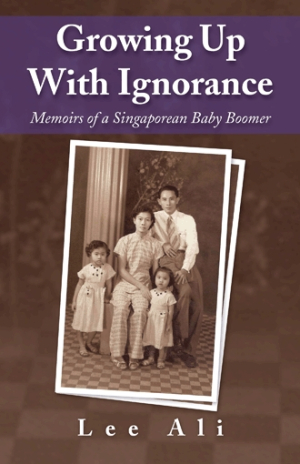Growing Up with Ignorance
Memoirs of a Singaporean Baby Boomer
Sweetly touching, yet sometimes shocking, this memoir provides a unique view of a child’s daily life in 1950s Singapore.
Lee Ali’s Growing Up with Ignorance: Memoirs of a Singaporean Baby Boomer is a simply written, powerful tale of a particular kind of childhood and upbringing. Born in Singapore in 1949, she was raised simultaneously in an immensely multicultural city and in great isolation, often staying within her family’s one room. By telling her story, she hopes to improve conditions for later generations. Her straightforward narrative is moving and sympathetic.
Ali’s mother was cold toward this eldest daughter, and used physical discipline to maintain control in the household. Her father was more tender and sympathetic, and appears to have struggled to relate to his wife. Both parents had been adopted, leaving Ali with a dearth of information about her biological background, a lack she feels acutely in trying to understand her family and herself. The resulting household navigates spare housing conditions, often sharing accommodations; experiences great poverty and insecurity; and participates in family and cultural traditions that bring comforting ritual as well as conflict and expense.
Festivals and events to honor the gods and celebrations such as weddings obligate the family to spend their limited funds in ways that cause quarrels within the household. When it is time for Ali to start school, she begins far behind her age group peers; her father feels strongly that she should attend English, not Chinese school, but she does not even recognize her English name, Lily, and misses role call the first day. However, she eventually becomes a highly successful student, achieving the highest level of education available, and receives the honor of working with an early, room-sized IBM computer—where she excels. Even at the end of Ali’s memoir, however, her future remains uncertain: will she make a life for herself as an independent adult, or remain under the thumb of her abusive and troubled mother?
The appeal of Ali’s story lies in its details. Occasionally sweetly touching, sometimes shocking, Growing Up with Ignorance provides a unique view of a child’s daily life in 1950s Singapore, as the country struggled to define itself. The tastes, smells, sights, and sounds she evocatively describes will be unfamiliar to most, as Singapore has since developed and changed a great deal; its many ethnic foods and her grandfather’s opium smoke figure strongly in the experience of this book.
Her writing style is unsophisticated, which adds a sense of authenticity. Ali’s is a singular story, plainly and sincerely told, and modestly packaged. If anything is lacking, it may be in the conclusion: what did Ali do with her advanced education; what was her experience with marriage or personal independence? But she has made a considered decision to leave these later chapters of her life untold. It is a mark of the engaging nature of her story that this omission is felt as a loss.
As a memoir of an exceptional childhood, Growing Up with Ignorance provides a remarkable and unusual glimpse of a moment in time and space. Its syntactic simplicity does not detract from the story, but makes it a quick and accessible read. In her hope for improved circumstances for future families, Ali has also told a compelling and evocative account that will appeal to diverse audiences.
Reviewed by
Julia Jenkins
Disclosure: This article is not an endorsement, but a review. The publisher of this book provided free copies of the book and paid a small fee to have their book reviewed by a professional reviewer. Foreword Reviews and Clarion Reviews make no guarantee that the publisher will receive a positive review. Foreword Magazine, Inc. is disclosing this in accordance with the Federal Trade Commission’s 16 CFR, Part 255.

